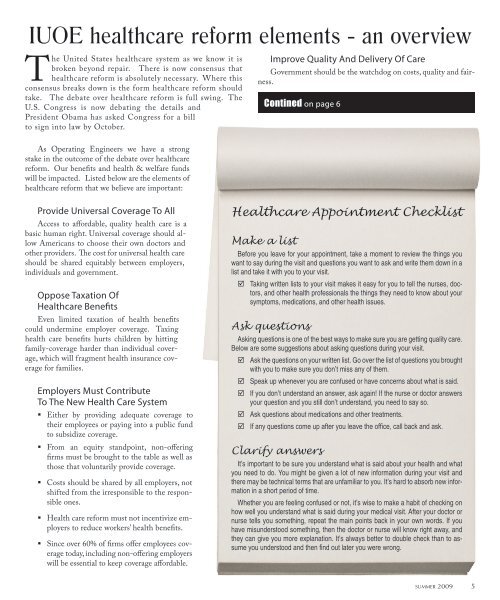Summer 2009 - International Union of Operating Engineers
Summer 2009 - International Union of Operating Engineers
Summer 2009 - International Union of Operating Engineers
Create successful ePaper yourself
Turn your PDF publications into a flip-book with our unique Google optimized e-Paper software.
IUOE healthcare reform elements - an overview<br />
The United States healthcare system as we know it is<br />
broken beyond repair. There is now consensus that<br />
healthcare reform is absolutely necessary. Where this<br />
consensus breaks down is the form healthcare reform should<br />
take. The debate over healthcare reform is full swing. The<br />
U.S. Congress is now debating the details and<br />
President Obama has asked Congress for a bill<br />
to sign into law by October.<br />
As <strong>Operating</strong> <strong>Engineers</strong> we have a strong<br />
stake in the outcome <strong>of</strong> the debate over healthcare<br />
reform. Our benefits and health & welfare funds<br />
will be impacted. Listed below are the elements <strong>of</strong><br />
healthcare reform that we believe are important:<br />
Improve Quality And Delivery Of Care<br />
Government should be the watchdog on costs, quality and fairness.<br />
Contined on page 6<br />
Provide Universal Coverage To All<br />
Access to affordable, quality health care is a<br />
basic human right. Universal coverage should allow<br />
Americans to choose their own doctors and<br />
other providers. The cost for universal health care<br />
should be shared equitably between employers,<br />
individuals and government.<br />
Oppose Taxation Of<br />
Healthcare Benefits<br />
Even limited taxation <strong>of</strong> health benefits<br />
could undermine employer coverage. Taxing<br />
health care benefits hurts children by hitting<br />
family-coverage harder than individual coverage,<br />
which will fragment health insurance coverage<br />
for families.<br />
Employers Must Contribute<br />
To The New Health Care System<br />
• Either by providing adequate coverage to<br />
their employees or paying into a public fund<br />
to subsidize coverage.<br />
• From an equity standpoint, non-<strong>of</strong>fering<br />
firms must be brought to the table as well as<br />
those that voluntarily provide coverage.<br />
• Costs should be shared by all employers, not<br />
shifted from the irresponsible to the responsible<br />
ones.<br />
• Health care reform must not incentivize employers<br />
to reduce workers’ health benefits.<br />
• Since over 60% <strong>of</strong> firms <strong>of</strong>fer employees coverage<br />
today, including non-<strong>of</strong>fering employers<br />
will be essential to keep coverage affordable.<br />
Healthcare Appointment Checklist<br />
Make a list<br />
Before you leave for your appointment, take a moment to review the things you<br />
want to say during the visit and questions you want to ask and write them down in a<br />
list and take it with you to your visit.<br />
;; Taking written lists to your visit makes it easy for you to tell the nurses, doctors,<br />
and other health pr<strong>of</strong>essionals the things they need to know about your<br />
symptoms, medications, and other health issues.<br />
Ask questions<br />
Asking questions is one <strong>of</strong> the best ways to make sure you are getting quality care.<br />
Below are some suggestions about asking questions during your visit.<br />
;; Ask the questions on your written list. Go over the list <strong>of</strong> questions you brought<br />
with you to make sure you don’t miss any <strong>of</strong> them.<br />
;; Speak up whenever you are confused or have concerns about what is said.<br />
;; If you don’t understand an answer, ask again! If the nurse or doctor answers<br />
your question and you still don’t understand, you need to say so.<br />
;; Ask questions about medications and other treatments.<br />
;; If any questions come up after you leave the <strong>of</strong>fice, call back and ask.<br />
Clarify answers<br />
It’s important to be sure you understand what is said about your health and what<br />
you need to do. You might be given a lot <strong>of</strong> new information during your visit and<br />
there may be technical terms that are unfamiliar to you. It’s hard to absorb new information<br />
in a short period <strong>of</strong> time.<br />
Whether you are feeling confused or not, it’s wise to make a habit <strong>of</strong> checking on<br />
how well you understand what is said during your medical visit. After your doctor or<br />
nurse tells you something, repeat the main points back in your own words. If you<br />
have misunderstood something, then the doctor or nurse will know right away, and<br />
they can give you more explanation. It’s always better to double check than to assume<br />
you understood and then find out later you were wrong.<br />
s u m m e r <strong>2009</strong> 5













